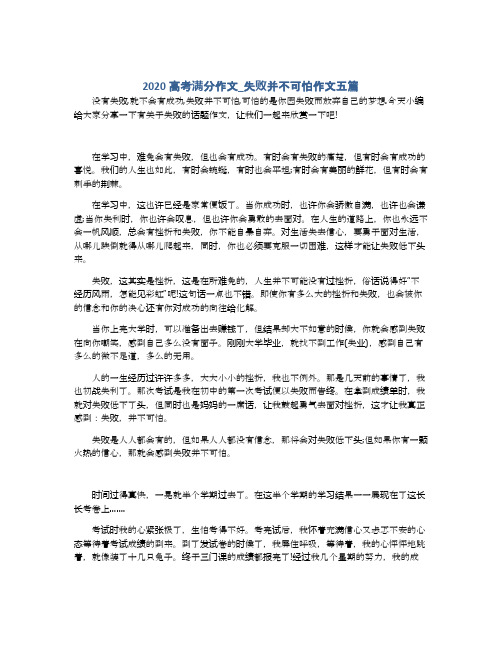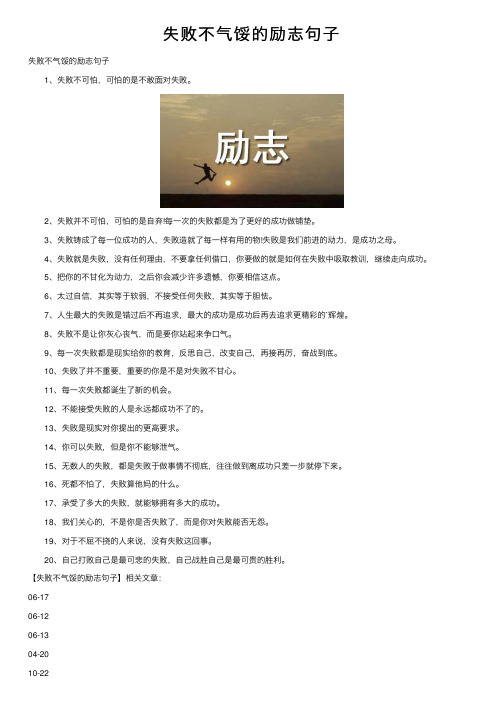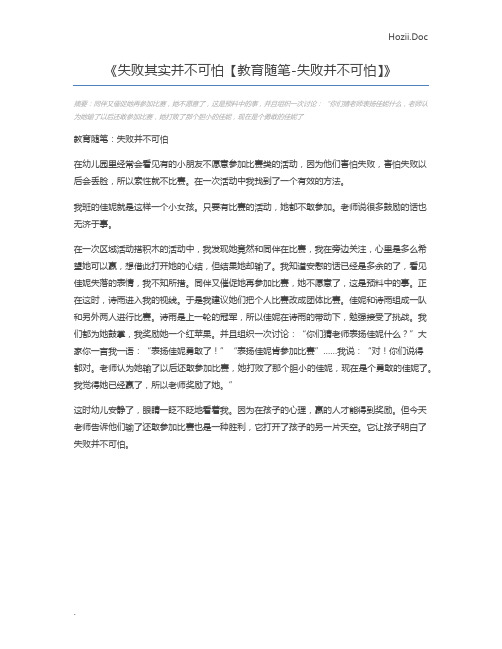失败其实并不可怕
关于失败并不可怕的名言

关于失败并不可怕的名言
关于失败并不可怕的名言:
1、这世界除了心理上的失败,实际上并不存在什么失败,只要不是一败涂地,就一定会取得胜利。
2、在厄运中满怀希望,在好运中不忘忧虑,这样便能泰然担待祸福。
忧劳可以兴业,逸豫可以亡身。
3、失败是坚忍的最后考验。
4、失败也是我需要的,它与成功对我一样有价值。
5、败了,你可能会失望;但如果不去尝试,那么注定要失败。
6、我坚持奋战五十余年,致力于科学的发展。
7、我们关心的,不是你是否失败了,而是你对失败能否无怨。
8、没有经历过逆境的人不知道自己的力量。
9、失败是成功之母。
10、我从来不知道什么是苦闷,失败了再来,前途是自己努力创造出来的。
人类历史是一部战胜艰险的历史。
2020高考满分作文_失败并不可怕作文五篇

2020高考满分作文_失败并不可怕作文五篇没有失败,就不会有成功,失败并不可怕,可怕的是你因失败而放弃自己的梦想.今天小编给大家分享一下有关于失败的话题作文,让我们一起来欣赏一下吧!在学习中,难免会有失败,但也会有成功。
有时会有失败的痛楚,但有时会有成功的喜悦。
我们的人生也如此,有时会蜿蜒,有时也会平坦;有时会有美丽的鲜花,但有时会有刺手的荆棘。
在学习中,这也许已经是家常便饭了。
当你成功时,也许你会骄傲自满,也许也会谦虚;当你失利时,你也许会叹息,但也许你会勇敢的去面对。
在人生的道路上,你也永远不会一帆风顺,总会有挫折和失败,你不能自暴自弃。
对生活失去信心,要勇于面对生活,从哪儿跌倒就得从哪儿爬起来,同时,你也必须要克服一切困难,这样才能让失败低下头来。
失败,这其实是挫折,这是在所难免的,人生并不可能没有过挫折,俗话说得好“不经历风雨,怎能见彩虹”呢!这句话一点也不错。
即使你有多么大的挫折和失败,也会被你的信念和你的决心还有你对成功的向往给化解。
当你上完大学时,可以准备出去赚钱了,但结果却大不如意的时候,你就会感到失败在向你嘲笑,感到自己多么没有面子。
刚刚大学毕业,就找不到工作(失业),感到自己有多么的微不足道,多么的无用。
人的一生经历过许许多多,大大小小的挫折,我也不例外。
那是几天前的事情了,我也初战失利了。
那次考试是我在初中的第一次考试便以失败而告终。
在拿到成绩单时,我就对失败低下了头,但同时也是妈妈的一席话,让我鼓起勇气去面对挫折,这才让我真正感到:失败,并不可怕。
失败是人人都会有的,但如果人人都没有信念,那将会对失败低下头;但如果你有一颗火热的信心,那就会感到失败并不可怕。
时间过得真快,一晃就半个学期过去了。
在这半个学期的学习结果一一展现在了这长长考卷上…….考试时我的心紧张极了,生怕考得不好。
考完试后,我怀着充满信心又忐忑不安的心态等待着考试成绩的到来。
到了发试卷的时候了,我屏住呼吸,等待着,我的心怦怦地跳着,就像装了十几只兔子。
失败乃成功之母的观点议论文7篇

失败乃成功之母的观点议论文7篇失败乃成功之母的观点议论文篇1失败是每个人都要面对的,是人生在所难免的必然,是前往成功道路的必经之路。
在我看来,失败其实并不可怕。
失败了,我们就应该继续努力,在中吸取教训,积累经验。
只要坚持,不怕困难,勇敢地,坦然地面对,总会有成功的一天的。
正所谓“失败乃是成功之母”。
没有失败的考验,哪来成功的喜悦呢?想要成功,就要从经得起失败的考验开始。
每个人的背后都会有成功的足迹,他们之所以能够成功,是因为他们不怕困难、有坚定的信念,能够坦然地面对失败,能够在失败中努力奋斗,从而慢慢地从失败者转变咸亨成功者。
失败过后,整理好心情,找回信心,继续努力,找出失败的原因,吸取教训,再向目标前进。
只要你肯努力,就有希望。
能够在失败中努力奋斗,不怕困难,经得起失败的磨练。
从而再从失败者转变成成功者,那才算是真正的成功。
“阳光总在风雨后。
”成功都是在失败中形成的。
再过之后现出的彩虹更加绚烂,失败过后获得的成功也更有真实感、更能激动人心。
但并不是说失败了就一定能成功。
想要成功,首先就得不怕困难、经得起挫折、经得起失败、有坚定的信念。
努力过了,即使没有成功,你也不会太过伤心,因为你已经努力过了,你已经对得起自己了。
相信我,其实失败并不可怕,只要你坚持,依然会有成功的希望。
成功,是需要失败来灌溉,然后才能够茁壮成长的!失败乃成功之母的观点议论文篇2古往今来,人们常说失败是成功之母。
失败,在人生中是个未知数,但这句话并不空虚,一个人只有经历失败,才能取得真正的成功。
面对失败,只要你不懈努力就一定能成功,但必须具备勇气和决心,告诉大家,我也有过这样的经历。
有一天,老师郑重其事地说:“同学们,明天就要考试,请大家好好复习,希望你们交出满意的答卷。
”老师一说完,顿时教室轰轰烈烈,像炸了锅似的,同学们都在议论考试的事。
我在心里暗暗想:大家都这么努力,我也不能掉链子。
放学后,我火速跑回家,妈妈刚一开门,我就“嗖”的一声跑到房间,拿起语文书就开始复习。
失败不气馁的励志句子

失败不⽓馁的励志句⼦失败不⽓馁的励志句⼦ 1、失败不可怕,可怕的是不敢⾯对失败。
2、失败并不可怕,可怕的是⾃弃!每⼀次的失败都是为了更好的成功做铺垫。
3、失败铸成了每⼀位成功的⼈,失败造就了每⼀样有⽤的物!失败是我们前进的动⼒,是成功之母。
4、失败就是失败,没有任何理由,不要拿任何借⼝,你要做的就是如何在失败中吸取教训,继续⾛向成功。
5、把你的不⽢化为动⼒,之后你会减少许多遗憾,你要相信这点。
6、太过⾃信,其实等于软弱,不接受任何失败,其实等于胆怯。
7、⼈⽣最⼤的失败是错过后不再追求,最⼤的成功是成功后再去追求更精彩的`辉煌。
8、失败不是让你灰⼼丧⽓,⽽是要你站起来争⼝⽓。
9、每⼀次失败都是现实给你的教育,反思⾃⼰,改变⾃⼰,再接再厉,奋战到底。
10、失败了并不重要,重要的你是不是对失败不⽢⼼。
11、每⼀次失败都诞⽣了新的机会。
12、不能接受失败的⼈是永远都成功不了的。
13、失败是现实对你提出的更⾼要求。
14、你可以失败,但是你不能够泄⽓。
15、⽆数⼈的失败,都是失败于做事情不彻底,往往做到离成功只差⼀步就停下来。
16、死都不怕了,失败算他妈的什么。
17、承受了多⼤的失败,就能够拥有多⼤的成功。
18、我们关⼼的,不是你是否失败了,⽽是你对失败能否⽆怨。
19、对于不屈不挠的⼈来说,没有失败这回事。
20、⾃⼰打败⾃⼰是最可悲的失败,⾃⼰战胜⾃⼰是最可贵的胜利。
【失败不⽓馁的励志句⼦】相关⽂章:06-1706-1206-1304-2010-2206-30 09-05 05-18 12-19 11-28。
失败并不可怕作文

失败并不可怕作文失败,并不可怕。
失败,并不可怕。
这是一个深刻的道理,一个让人在挫折面前坚定信念的哲理。
在人生的道路上,每个人都会面对失败,但是失败并不可怕,关键在于我们如何看待和应对失败。
失败是成功之母,这是一个耳熟能详的道理。
在实践中,我们常常会遇到各种失败,无论是在学业上,事业上,还是生活中,失败都会时不时地出现在我们面前。
但是,失败并不可怕,因为失败教会了我们如何去面对困难,如何去克服挫折,如何去不断地完善自己。
正如莎士比亚所说,“失败是成功之母。
”失败给了我们宝贵的经验和教训,让我们更加成熟,更加坚强。
正是因为失败,我们才能够更加清晰地认识自己,更加明确地知道自己要走的道路,更加坚定地朝着自己的目标前进。
面对失败,我们更应该学会积极乐观地看待。
失败并不可怕,关键在于我们如何看待失败。
有的人会因为失败而灰心丧气,甚至放弃自己的目标和梦想;而有的人却会因为失败而更加努力,更加坚定地走自己的路。
正如美国作家罗伯特·弗罗斯特所说,“我选择了比较少走的路,这使得我生活中的一切都不同。
”面对失败,我们更应该学会从失败中吸取教训,总结经验,不断完善自己,让自己更加坚强,更加成熟。
正是因为失败,我们才能够更加坚定地走自己选择的路,不断追求自己的梦想。
在人生的道路上,我们都会遇到各种各样的挫折和失败。
但是,失败并不可怕,关键在于我们如何看待和应对失败。
失败是成功之母,它教会了我们如何去面对困难,如何去克服挫折,如何去不断完善自己。
面对失败,我们更应该学会积极乐观地看待,从失败中吸取教训,总结经验,不断完善自己。
正是因为失败,我们才能够更加坚定地走自己选择的路,不断追求自己的梦想。
失败,并不可怕,关键在于我们如何看待和应对失败。
失败其实不可怕精选作文500字

失败其实不可怕精选作文500字“人无完人,金无足赤。
”十全十美的,失败是在所难免的,所以失败是常态,其实不可怕。
接下来小编搜集了失败其实不可怕精选作文500字,欢迎查看,希望帮助到大家。
篇一:失败其实不可怕精选作文500字在人生中,出现挫折是难免的事,但是这种时候最重要的,即是有没有再站起来的能力。
萧建华是一位有名的生命斗士,他得了一种罕见疾病──渐冻人,而且更不幸的是他是在别人生最灿烂的那段时期患上的。
这种病会先从肢体末梢开始发作,患者会感到手指或脚趾有些无力,渐渐地延伸到手掌,使手臂或者双腿使不上力,再继续往罪中心蔓延,直到整个身体完全不能动,只剩下清楚的意识。
就这样,一个有着大好前程的青年,毁于疾病之手。
他悲愤、他哀怨,但也改变不了事实。
后来更发生了一场火灾,使日夜照顾他的学妹死亡。
在悲伤欲绝之际,他也想过要自杀。
不过他并没有这样做,反而振作起来,还下定决心要办演讲,让更多人知道他的故事,以及他不顺从病魔的坚强意志,以鼓励更多身处于窘境的人。
他成功地将他的信念传达了。
假如当初萧建华没有振作起来,那今天就不会有那些撼动人心的演讲,更不会有人被他感动到──包括我在内。
他给了我一种无论遇到什么事,都要努力坚持下去的信念。
失败了、挫折到了又怎样?再站起来就好啦!与其怨天尤人,还不如重新开始,总比一事无成徒留恨来得好。
失败其实不可怕,可怕的是我们没有再站起来的决心;挫折其实不可恨,可恨的是我们逾越不了挫折的害怕!篇二:失败其实不可怕精选作文500字时间过得真快,一晃就半个学期过去了。
在这半个学期的学习结果一一展现在了这长长考卷上……。
考试时我的心紧张极了,生怕考得不好。
考完试后,我怀着充满信心又忐忑不安的心态等待着考试成绩的到来。
到了发考试试卷的时候了,我屏住呼吸,等待着,我的心怦怦地跳着,就像装了十几只兔子。
终于三门课的成绩都报完了!经过我几个星期的努力,我的成绩总算没有那么差了,可是我也十分不满意,因为我的语文成绩和科学成绩没有到达我理想中的目的。
失败并不可怕日记5篇

失败并不可怕日记5篇失败并不可怕日记(一)今天,我发现曾几何时,人们对失败胆战心惊,他们害怕失败,不敢面对它,不敢适应它。
试问:哪一位科学家没有进行过失败的实验?哪一位身经百战的将军未曾打过败仗?哪一位政治家没有参加过失败的竞选?没有!失败是人生中不可缺少的一部分,经历过失败的人生才完整。
因此,失败并不可怕。
失败其实是很重要的。
爱迪生未发明电灯泡,光是选用灯丝的材料就历经了千余次的失败,而每一次的实验都为他日后的成功奠定了基础,终于有朝一日选出了合适的材料。
爱迪生用失败的实验换来了最后的成功,如果他害怕了,他最后能成功吗?谈到失败,大家一定不会忘记林肯,这位鞋匠的儿子。
如果,他第一次经商失败便放弃了,那么会有他以后经商成功吗?如果他第一次参议失败便放弃了以后的政治生涯,他还会成为以后的美国总统?是失败磨练了意志,在破产、丧妻、落选的失败中,他仍保持了他的意志,是他有了坚定的信念,他才得以成功。
在放眼中国历史,我的目光又投向了项羽。
项羽,这位“楚汉霸王”,在与刘邦的“楚汉之争”中,曾经不可一世的他,失败了,败得彻彻底底,落了个“自刎乌江”的结果。
可有谁说他是失败者呢?在中国的历史上,一直留有项羽的一席之地,让人们所铭记。
他的名号响彻在历史的长廊中。
人们对他的认识,并不比刘邦少。
失败,也有时让人铭记。
失败并不是一无所是,并不可怕。
失败可以是成功的基石,可以是人生的磨刀石,可以是人生的记录笔,可以是通向成功的殿堂。
失败并不可怕!失败并不可怕日记(二)今天,我不断反思自己,一次次的失败是否会让人一蹶不振?一次次的失望到最后是否会演变为绝望?不!绝对不会的!因为我相信坚持不懈终将成功。
爱迪生的“光明之路”走得是那么的艰辛。
为了使小小的灯泡能照亮我们的生活,他不厌其烦地尝试各种材料用作灯芯。
在探索的过程中要经历多少次失败与失望才能换来一次成功和喜悦。
一千多次的失败,要是换做常人,可能早已放弃。
然而,就是因为这股坚持不懈的干劲,才能使得如今的世界充满光明。
失败并不可怕,仍需奋发向前的名言

失败并不可怕,仍需奋发向前的名言(原创实用版)目录1.引言:名言的重要性2.名言的含义:失败并不可怕,仍需奋发向前3.失败是成功的垫脚石4.从失败中汲取经验教训5.奋发向前,勇往直前6.结论:以名言为指导,走向成功正文一、引言名言是智慧的结晶,可以激励我们奋发向前,引导我们走向成功。
在人生的道路上,我们会遇到许多困难和挫折,如何正确看待和应对这些挫折,是我们走向成功的关键。
有一句名言:“失败并不可怕,仍需奋发向前”,为我们提供了面对失败的正确态度和行动指南。
二、名言的含义:失败并不可怕,仍需奋发向前失败是人生道路上不可避免的一部分。
这句名言告诉我们,失败本身并不可怕,关键在于我们如何看待和应对失败。
失败并不意味着终结,而是新的开始。
在失败之后,我们需要总结经验教训,为下一次尝试做好准备。
三、失败是成功的垫脚石失败可以让我们更加清楚地认识到自己的不足之处,从而找到改进的方向。
在失败中,我们会发现成功的道路并非一帆风顺,但正是这些曲折和坎坷,让我们更加珍惜来之不易的成功。
因此,失败是成功的垫脚石,是我们走向成功的必经之路。
四、从失败中汲取经验教训失败并不可怕,关键在于我们是否能从失败中汲取经验教训。
在失败后,我们要认真反思,找出导致失败的原因,并加以改进。
这样,我们才能在失败中不断成长,不断进步。
五、奋发向前,勇往直前在失败之后,我们不能沉浸在失败的阴影中,而是要奋发向前,勇往直前。
只有保持积极的心态,才能在失败后重新站起来,迎接新的挑战。
当我们勇敢面对失败,继续前行时,成功就在不远处。
六、结论:以名言为指导,走向成功这句名言“失败并不可怕,仍需奋发向前”为我们提供了走向成功的指南。
我们要把这句名言作为自己的座右铭,时刻激励自己,勇敢面对失败,不断追求进步。
成功固然可喜,失败并不可怕的演讲稿(汇编)

成功固然可喜,失败并不可怕的演讲稿(汇编)时间:2020年08月02日编稿:作者二第一篇:成功当然可喜,失败并不可怕的演讲稿新的一轮学科比赛己经结束了,又到了几家快乐几家愁的时候。
首先在这里向取得优异成绩和获得进步的同学们表示热烈的祝贺和衷心的问候。
考试有成功也有失败,就象生活中既有阳光也有黑暗那样,人人都不可幸免。
假如将成功、快乐比做太阳,那失败、挫折就可以比作月亮。
人不能只企求永久在阳光下生活,在生活中没有失败挫折是不现实的,也是不可能的。
有句谚语讲的好:马儿虽有四只足,有时也会摔一跤。
人难免会遇到挫折,没有经历过失败的人生不是完整的人生。
没有河床的冲涮,便没有钻石的明亮;没有挫折的考验,也便没有不屈的人格。
挫折和失败绝不能和恶运、坏事、没出息划等号。
一经打击就灰心失望,垂头丧气,意志消沉才是真真的失败,是懦夫的表现。
而能从失败中吸取教训,却是通向成功的阶梯。
日本闻名企业家松下幸之助就这样说过:“人之可贵在于跌倒一次就能有所领悟,而不在于莫名其妙地跌跌起起。
“天落大任于斯人也,必先苦其心志劳其筋骨,饿其体肤,空乏其身,行拂乱其所为,增益其所不能。
”就象英国哲学家培根说的那样:“超越自然的奇迹多是在对逆境的制服中浮现的。
”古今中外,在逆境中奋发图强,制造丰功伟绩的伟人比比皆是。
一旦失败己成定局,就不要对他耿耿于怀,要勇于淡忘他。
当挫折和失败的乌云笼罩我们时,我们一定要从失败的阴影中走出来,战胜沮丧,克服悲伤情绪,化悲痛为力量,重新振作起来。
跌倒了,就要爬起来,反思为何会跌倒,不能躺下不干;不仅要干,还要专挑硬骨头啃,以昂扬的斗志投入到新一轮学习中去,象艾柯卡说的那样:奋力向前,即使时运不济;永不无望,哪怕山崩地裂。
同学们,学习道路上是不可能一帆风顺的,成功,当然可喜可贺,但路漫漫其修远兮;失败,并不可怕,不经历风雨怎么见彩虹。
笑到最后的人,才是真正的胜利者。
第二篇:励志演讲稿:成功当然可喜,失败并不可怕新的一轮学科比赛己经结束了,又到了几家快乐几家愁的时候。
形容失败不可怕的诗句

形容失败不可怕的诗句
嘿,你知道吗?“江东子弟多才俊,卷土重来未可知”,这诗句就像
是在告诉我们,失败算个啥呀!就好比走路摔了一跤,难道就趴在地
上不起来啦?咱得拍拍屁股继续走呀!
你想想看,古往今来多少大人物都经历过失败呢。
就说那刘备吧,
一开始东奔西跑,连个稳定的地盘都没有,不也没放弃嘛。
要是他因
为几次失败就垂头丧气,那还能有后来的蜀汉吗?这就好像爬山,你
可能会在半路上滑倒几次,可只要你坚持往上爬,总有一天能登顶呀!
“长风破浪会有时,直挂云帆济沧海”,这句诗多豪迈呀!失败就像
是海上的风浪,它可能会把我们的船吹得摇摇晃晃,但只要我们有勇
气有决心,总有一天能乘风破浪,驶向成功的彼岸。
你说是不是?
还记得西楚霸王项羽不,他虽然最后失败了,可他的故事却流传千
古呀。
这就告诉我们,失败并不意味着一切都结束了,反而可能会让
我们的故事更加精彩呢!哎呀,你再想想,要是没有失败,哪来的经
验教训呀,哪能知道自己哪里不足呢?
所以呀,失败真的不可怕,它就是我们人生路上的一块绊脚石而已,踢开它,继续大步向前走!别因为一次失败就畏手畏脚的,要勇敢地
去尝试,去拼搏,去追求自己的梦想!失败了又怎样,大不了从头再
来呗!我的观点就是,失败只是暂时的,只要我们不放弃,就一定能
迎来成功的那一天!。
失败其实不可怕

篇一:《失败并不可怕》失败并不可怕,只要我们怀着一颗不服输的心,勇往直前,那么胜利将不会离我们太远。
只要厄运打不垮信念,希望之光就会驱散绝望之云。
疑问是打开知识大门的钥匙。
错误是正确的先导。
提出了正确的问题,往往等于解决了问题的大半。
面对梦想道路上的困苦艰难坎坷,执著是最好的利刃,它会帮助一个人劈开艰难,穿越困境,抵达铺满鲜花的梦想。
很多不成功并非没有机会,而是内心充斥了自以为是、猜疑臆断,将机会拦挡在了命运之外。
想要在机遇降临的时候及时地捕捉住,不仅需要充实自己掌握机遇的能力,还需要不断地剔除心中的杂草:浮躁、狭隘、自大……留空间给机遇扎根。
世上从不缺少机会,只是缺少发现机会的眼睛。
把香皂挖空一点是商机,但却需要先将心中的抱怨、计较、依赖挖空。
挖空了惰性才可能给机遇营造出绽放的空间和环境。
创造机遇有时并不难,只要懂得把泥土从不需要的地方移到需要的地方,但移动之前,要先能够把心中“理所当然”的冰块移走,把想像春天般铺开。
金矿的山上还有着其他花朵,除了具备发现的眼睛外,还需要有着肯流汗的心。
成功提示:金子常常就埋在身旁的泥土里,勤奋是最好的点金指。
每个人都是赤手空拳来到这个世界的,有的人成功,有的人失败,都有着各自原因。
条件不会摆放在每个人面前,学会没有条件的时候自己去创造条件,才可能走近成功。
很多人总是埋怨没有成功的机会,其实是因为他们没有发现机会的眼光。
机会总是存在的,只要你善于捕捉,它往往就在你周围,在成功的道路上,如果你没有耐心去等待成功的到来,那么,你只好用一生的耐心去面对失败。
对一个聪明人来说,每一天都是一个新的开始,你当然可以谋划自己的理想和前程,甚至可以放眼世界寻找更好的机会,但不要忘了我们首先得为“今天的牛奶努力”,在每个“今天”执著、塌实地走好每一步,展现在你眼前的将是满园春色。
面对问题,我们不能退缩,因为退缩并不能解决问题。
只有努力寻求解决之道,才是上策。
不要把成功想得太遥远,有时候,它离我们很近,只是由于我们的疏忽而与它失之交臂。
失败不可怕,可怕的是你因此放弃

失败不可怕,可怕的是你因此放弃
失败不可怕,可怕的是你因此放弃
失败不可怕,可怕的是你因此放弃
在这世上谁都不敢说我没有失败过,既然谁都失败过,那就不用太过在意失败。
放眼望去那些成功者,他们只不过把失败看的淡了一些。
其实我们不用太过在意失败,失败只是一时的,假如你无法将失败看淡一些,那么你一直就是失败的。
我们应该将失败当做自己上进的动力,冲破失败,并且去打败失败。
在这个世上没有永远的成功者,也没有永远的失败者。
只要你愿意克制打败失败,你愿意是一个成功者。
我相信有一天你一定可以是一个成功者。
失败不可怕,可怕的是你因放弃。
这是一种消极的态度,胜败乃兵家常事,连古人都知道失败其实不可怕。
这一句胜败乃兵家常事。
我相信许多人都知道,可是并未做到。
近年来,学生因高考失利而放弃自己的生命。
就因为一次的失利就放弃自己的生命这样值得吗?不值得。
爱迪生经过1001次实验才发明了点灯,爱迪生失败1000次都没有放弃,而你就因为失败就放弃。
你也许要说他与我有什么关系?我们现在之所以要向古人们学习,因为他们在恶劣的环境下都能坚持而我们现在生活的这么好,有什么理由在失败后不坚持下去呢?
失败不可怕,可怕的是你因此放弃。
让我们打破这一种消极的态度,持之以恒,为自己的梦想而努力,我们不想不要当永远的失败者,我们要当一个成功者,下一个成功者就是我们,加油!。
原来失败并不可怕作文精选

原来失败并不可怕作文精选回首过去,我总是在考试中一次一次的失败。
我也总是在这失败的阴影中无法走出去,甚至为了发泄情绪向父母出气。
可是有一天我听到了父亲对我说的一句话,使我重新鼓起勇气面对挑战。
那是在我上初一的时候,期末考试后的那几天我心神不宁,觉得这次考试一定考砸了。
果然不出我所料,数学考了八十几分。
当那一张成绩单出来后,我彻底崩溃了,我躲进自己的房间里大哭。
等父亲听到这个消息时十分生气,他准备把我叫过来好好教训一番。
但当他走到门口时,听到了我的哭声就跑到我的房间门口问发生了什么,其实父亲知道我是因为成绩的事情而伤心。
我急忙擦掉眼泪,翻开房门,对父亲说:“没什么〞。
然后我以为父亲会一如既往地教导我,可并没有。
父亲用他那粗糙的手指擦掉了我的泪痕,并对我说:“孩子,爸爸知道你考的不好,但是它已经过去了,你应该向前看。
失败了,没关系,站起来。
失败,其实不可怕,可怕的是你没有从失败中汲取教训,这次数学没考好,那我们就向着数学去努力,没事的。
老爸相信你,下次一定能考好〞。
老爸的这些话使我从迷茫的大雾中找到了希望的火把,并朝着数学去努力。
从那天以后,我重新燃起了斗志,眼睛中带着希望的火苗,向我的下一次考试发起了猛烈进攻。
在学校时,我每天都会在课余时间里练习我的数学,甚至在夜晚学习到很晚,也依然不敢放松……就是在这种环境下,我像一匹寂寞的孤狼一样吞食着食物。
时间一天一天的过去,我的数学成绩也一天一天的提升。
直至考试的那一天,我将我这些天的成果都写在了试卷上。
等考试成绩出来,是啊,连我都都被震惊了。
我考了第一,老爸看到这个成绩单后,落泪了……回望过去,我还是一个成绩不起眼的小人物,但是经历了那些失败后,我汲取了失败的教训,获取了许多经验。
正是这些使我重拾信心,面对全新的挑战。
此时,我的耳畔又响起了那句话。
失败,其实不可怕,可怕的是你没有从失败中汲取教训。
原来,失败并不可怕!。
国旗下演讲-失败并不可怕

国旗下演讲:失败并不可怕
国旗下的演讲:期中考试
刚结束的期中,可谓几家欢喜几家愁,有的人在此中取得了自我的突破,却以失败告终。
一场考试,并不能反映全部。
但它至少能说明一部分问题——那便是努力。
也许努力与成功不会成正比,但我相信,它们一定正相关,只有付出了更多的努力,成功的几率才会加大砝码,只有付出了更多的努力,失败也不会后悔,至少我们尽力了。
只有付出了更多的努力,才对得起爱我们的每一个人——老师,父母,朋友,才对得起我们自己。
失败并不可怕,只说明我们还不够努力。
成功也并不意味着完美。
只证明了我们与完美的距离更近了。
只要相信彩虹在暴风雨之后最美,在过程中一步步脚踏实地地去完成。
成功就会近在咫尺。
在那时回头看一看,你会明白,结果早已不重要。
古今之成大事业,大学问者,必经过三种境界:“昨夜西风凋碧树,独上高楼,望尽天涯路”此第一境也;“衣带渐宽终不悔,为伊消得人憔悴”此第二境也;“众星寻他千百度,蓦然回首,那人却在灯火阑珊处”此第三境也。
只要心中坚信“成功,不是靠努力,而是努力。
”希望的光芒则会生生不息。
感谢您的阅读!。
失败并不可怕,可怕的是不懂得如何爬起来

失败其实不行怕,可怕的是不懂得怎样爬起来生命对某些人来说是漂亮的,这些人的一世都为某个目标而奋斗。
销售产品要针对顾客的心,不要针对顾客的头。
没有人富裕得能够不要他人的帮助,也没有人穷得不可以在某方面给他人帮助。
凡诚心试试助人者,没有不帮到自己的。
踊跃者相信只有推进自己才能推进世界,只需推进自己就能推进世界。
每一日你所付出的代价都比前一日高,由于你的生命又消短了一天,因此每一日你都要更踊跃。
今日太可贵,不该当为酸苦的忧愁和辛涩的怨恨所销蚀,抬起下巴,抓住今日,它不再回来。
一个人最大的破产是无望,最大的财产是希望。
行动是成功的阶梯,行动越多,登得越高。
环境永久不会完美无缺,悲观的人受环境控制,踊跃的人却控制环境。
事实上,成功仅代表了你工作的1%,成功是 99%失败的结果。
不要等候时机,而要创建时机。
成功的法例极为简单,但简单其实不代表简单。
假如寒暄不过打个招呼就了事的话,那与猴子的呼喊声有什么不一样呢?事实上,正确的寒暄一定在短短一句话中显然地显露出你他的关心。
昨晚多几分钟的准备,今日少几小时的麻烦。
拿望远镜看他人,拿放大镜看自己。
使用双手的是劳工,使用双手和脑筋的舵手,使用双手、脑筋与心灵的是艺术家,只有合作双手、脑筋、心灵再加上双脚的才是销售员。
做对的事情比把事情做对重要。
“人”的构造就是互相支撑,“众”人的事业需要每一个人的参加。
竞争颇似打网球,与球艺赛过你的敌手竞赛,能够提升你的水平。
只有不停搜寻时机的人材会实时掌握时机。
你能够选择这样的“三心二意” :信心、恒心、信心;创意、愿意。
失败乃成功之母。
逆水行舟,不进就退。
忍一时海不扬波,退一步天南地北。
失败其实不行怕,可怕的是不懂得怎样爬起来。
做人同意出错,但相同的错误不一样意犯二次。
一个人贫困不是口袋贫困,而是脑袋贫困,你要要富裕的想法,才能过富裕的生活。
赚--- 分为“贝”及“兼”,古代通“贝” 指钱,兼为兼职,要想挣更多的钱,应当懂得学会兼职。
[励志故事]失败并不可怕,每个人都有失败的权利
![[励志故事]失败并不可怕,每个人都有失败的权利](https://img.taocdn.com/s3/m/5bf5551503020740be1e650e52ea551810a6c9ba.png)
[励志故事]失败并不可怕,每个人都有失败的权利失败并不可怕,每个人都有失败的权利也许你没有经验,也许你已经颓废,你对失败的恐惧无法立即消除。
因此,当你面对困难时,你会下意识地想要逃避,你必须时刻提醒自己:不要陷入消极情绪。
不要担心,这也是暂时的。
你只要注意你的目标,不要在胜利的路上迂回不前!要成为一个成功的人,我们必须训练自己解决问题,知道如何从失败中找到成功。
在每一次不成功的努力中,我们都可以学到一些对自己有价值的事情,得到“和失败搏斗的能力”,这也是成长中必定要经历的过程。
大多数父母不想看到他们的孩子遭受挫折,但抵抗挫折的能力来自失败。
他们越早经历失败,他们就会变得越强大。
训练学举重要由轻的开始,慢慢地增加重量,直到后来不费力地举起很重的杠铃。
训练孩子接受压力和失望也是一样,父母要给予他们支持和关爱,锻炼他们对抗挫败的能力。
只有这样,他们长大成人时,才能有足够的能力去处理极大的恐惧和困难的问题。
经历过挫折的人性格坚强,心理素质成熟稳定。
当他们遭遇挫折时,他们不会像稻草人一样在风雨中摇摆。
他们坚强而执着。
许多心理学家认为,失败能让人变得更坚强、更谨慎。
一旦你发现自己挺过了危机,你随后的损失就会相对减少。
小孩子犯错时,如果可以不受到责备,他们将乐于尝试错误,并争取更多成功的机会。
无论成功与否,他们下一次面对问题时,会觉得轻松自在多了。
您是否将失败或错误消息用作有价值或有用的工具?还是你只是在责怪自己犯了错误,浪费了时间?没有达到目标是令人失望的,大多数人都受到了伤害,但这是帮助我们成功的宝贵经验。
它提供了一种不成功的体验,所以不要拒绝。
失败是可以标示的,下一次你可以按标示避免犯相同的错误。
一位心理医师曾说:“每一个人都有失败的权力。
”你现在知道那是你的权力了,所以把害怕失败的恐惧抛开吧!失败者认为成功人士没有麻烦。
他们认为,一旦你达到顶峰,你就不会再有麻烦或恐惧。
这和“从现在起过上幸福快乐的生活”的神话一样不现实。
失败其实并不可怕【教育随笔-失败并不可怕】

Hozii.Doc. 《失败其实并不可怕【教育随笔-失败并不可怕】》摘要:同伴又催促她再参加比赛,她不愿意了,这是预料中的事,并且组织一次讨论:“你们猜老师表扬佳妮什么,老师认为她输了以后还敢参加比赛,她打败了那个胆小的佳妮,现在是个勇敢的佳妮了教育随笔:失败并不可怕在幼儿园里经常会看见有的小朋友不愿意参加比赛类的活动,因为他们害怕失败,害怕失败以后会丢脸,所以索性就不比赛。
在一次活动中我找到了一个有效的方法。
我班的佳妮就是这样一个小女孩。
只要有比赛的活动,她都不敢参加。
老师说很多鼓励的话也无济于事。
在一次区域活动搭积木的活动中,我发现她竟然和同伴在比赛,我在旁边关注,心里是多么希望她可以赢,想借此打开她的心结,但结果她却输了。
我知道安慰的话已经是多余的了,看见佳妮失落的表情,我不知所措。
同伴又催促她再参加比赛,她不愿意了,这是预料中的事。
正在这时,诗雨进入我的视线。
于是我建议她们把个人比赛改成团体比赛。
佳妮和诗雨组成一队和另外两人进行比赛。
诗雨是上一轮的冠军,所以佳妮在诗雨的带动下,勉强接受了挑战。
我们都为她鼓掌,我奖励她一个红苹果。
并且组织一次讨论:“你们猜老师表扬佳妮什么?”大家你一言我一语:“表扬佳妮勇敢了!”“表扬佳妮肯参加比赛”……我说:“对!你们说得都对。
老师认为她输了以后还敢参加比赛,她打败了那个胆小的佳妮,现在是个勇敢的佳妮了。
我觉得她已经赢了,所以老师奖励了她。
”这时幼儿安静了,眼睛一眨不眨地看着我。
因为在孩子的心理,赢的人才能得到奖励。
但今天老师告诉他们输了还敢参加比赛也是一种胜利,它打开了孩子的另一片天空。
它让孩子明白了失败并不可怕。
- 1、下载文档前请自行甄别文档内容的完整性,平台不提供额外的编辑、内容补充、找答案等附加服务。
- 2、"仅部分预览"的文档,不可在线预览部分如存在完整性等问题,可反馈申请退款(可完整预览的文档不适用该条件!)。
- 3、如文档侵犯您的权益,请联系客服反馈,我们会尽快为您处理(人工客服工作时间:9:00-18:30)。
失败其实并不可怕F•司各特•菲茨杰拉德(F. Scott Fitzgerald)曾经说过:“美国人的生命中没有第二幕。
”为数众多的企业家、投资者和高管肯定希望他是在胡说。
在过去的18个月中,许多人身败名裂,涌现了许多轰动一时的解雇事件,大量企业宣告破产。
我担心,在这个数字化的世界里,此类污名将被永远记录在案。
我们中间没有多少人能够毫发无损地避开这次经济衰退的打击——各种各样的错误已经被大量曝光。
因此我们都应该保持一种乐观的信念:这个世界比人们普遍认为的更为宽容。
失败后东山再起既困难又容易(后面一点有些奇怪)。
困难是因为你的履历上有了污点;容易是因为如果你以前成功过,你就知道如何才能成功。
尽管我们对遭受严重挫折的人持怀疑态度,但我们也对来之不易的经验表示尊敬。
F Scott Fitzgerald said: “There are no second acts in American lives.” An awful lot of entrepreneurs, investors and executives must hope he was talking nonsense.The past 18 months have seen many reputations ravaged,plenty of high-profile sackings and a lot of business failures. I am afraid that in this digital world, such blemishes are recorded for all time.Not many of us will emerge entirely unscathed from the battering of this downturn –a great deal of mistakes of different sorts have been exposed. So we should all maintain an optimistic belief that the world is more forgiving than is commonly supposed.Career comebacks from disaster are both difficult and, oddly, easy. Difficult because your record has been blighted; easy because if you have achieved triumphs before, you know how it's done. While we are suspicious of someone who has suffered a serious setback, we also respect hard-won experience.Moreover, the doctrine of redemption is a central part of our culture. The idea that someone is an irredeemable loss seems incredibly brutal. Such a judgment feels as if it should be reserved for those who have been criminal, repeatedly negligent, or created damage on a grand scale.Of course, society exalts management talent too much, so when the pendulum swings we relish having fallen leaders to blame. Those who rise to thetop are lavishly rewarded, and vilification for incompetence is part of the bargain. If you cannot stomach the risk, do not strive for high office.When you dig deep into a CV, most reveal missteps – and some outright cock-ups. These negatives are rarely highlighted by the author, but I always prefer an interviewee who is honest when questioned about past errors, rather than evasive. Straightforward admission and an explanation of the lessons learnt appear to me the best policy. After all, we all know life is an imperfect affair. I am convinced that the world's mental hospitals are full of misguided souls who believed otherwise, and cannot cope with the messiness of reality. As Samuel Smiles said: “He who never made a mistake never made a discovery.”Success often breeds arrogance; one of the benefits of defeat – and there aren't many – is that it tends to produce a humbler personality. Most of us are more rounded characters for having got things wrong. I read recently that executives should not consider their work done until they have tackled a turnround. Those who have overcome adversity are likely to be better equipped to deal with such challenges than someone who has sailed along without even a hiccup. A pummelling toughens you up, makes you fitter for the next engagement. And as long as you don't cave in to disappointment, recovery is always a possibility.Big wins early on can be a curse. They may give you the impression that everything else is a downward trajectory. After all, no one wants to be labelleda has-been.One of the cures for this disease is the ability to adapt your expectations and reinvent yourself if the door has slammed shut on your first profession. There are many sorts of hero, and most of us have more than one skill. The danger of obsessive specialisation is thatif that field dies, where do you go? I hear of former financiers, fired from their bank and fedup with the City, who are retraining as schoolteachers. Now that I admire.Switching disciplines can be a tonic, but complete withdrawal from the fray must be avoided if you are to make progress. Action is the antidote to despair. Equally, self-pity is harmful. Focus instead on building a mutual support network, finding a new mission, and discovering ways to add value all across the waterfront.Just as bankruptcies never happen just because of bad luck, so a rebound is not simply a matter of chance – it requires industry, motivation andintelligence. So, whatever your misfortunes, you should endeavour to stay busy and bear in mind that everyone gets another opportunity or two if they keep trying.。
